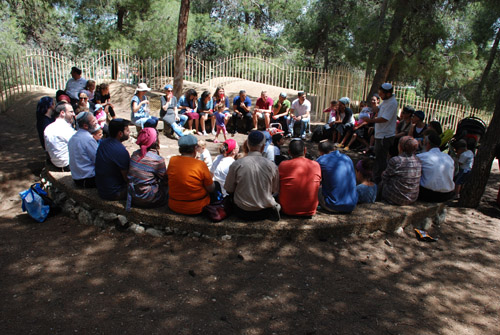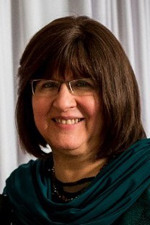
By Toby Klein Greenwald

EFRAT, Israel — My in-laws got married in a forest in Slovakia during the Holocaust in 1942. They gave birth to a little boy, and about six months before the war was over, went into hiding in a storeroom beneath the home of a non-Jewish woman in a nearby village. Since a toddler could not be kept quiet, the woman kept him above ground, with her in the house, and told neighbors she was looking after the child of her sister, whose husband was away at the front.
My mother-in-law was pregnant at the time that they went into hiding. When her time came due, she walked many miles to a hospital where she had a non-Jewish friend who was a nurse, who delivered her secretly in a side room. There was no way to take the baby girl back into hiding, so the nurse told her she would give the baby for safe-keeping to a woman she knew who would watch her till the war was over. And of course, no one knew when that would be.
So with heavy heart, my mother-in-law walked back, many miles, a few days after giving birth, to her hiding place under the floorboards.
Several months later the war was over. My in-laws went to the address given them by the nurse, and, as my mother-in-law told the story, “I knew as soon as we walked into the courtyard that there was no baby there. There were no diapers drying on the line, no buggy…” They knocked on the door and the woman told them that the baby had died. She took my father-in-law to the cemetery to show him the grave, and (my sister-in-law told me this part) he dug the little infant up and reburied her in the local Jewish cemetery.
In 1949 they made aliya to Israel. For six months they lived in a “ma’abara” – a makeshift tent community set up in Be’er Yaakov, before they moved to Jerusalem, where my husband and his siblings grew up. Both my in-laws passed away some years ago.
On the first day of chol hamoed this year (intermediate days of Passover), the extended family (siblings and their progeny), decided to get together in a forest clearing in Efrat so the next generation could get to know each other a little better. About 50% of them are in the photo featured in this column. (Some came later, some are abroad, some couldn’t make it.)
To the outsider it would have appeared as just one more family gathering. But I am always moved at these events because everyone in this photo is either the son or daughter (plus spouses), or the grandson or granddaughter (plus spouses), or the great-grandson or great-granddaughter, of my mother-in-law and father-in-law, Leah and Menachem Greenwald, of blessed memory, who lost almost their entire families in the Shoah.
They now have scores of offspring – scores — scattered throughout the land of Israel, with a wide variety of religious and ideological beliefs. They are haredi and religious-nationalist (of various types) and more traditional and less traditional. They live as far north as Haifa and as far south as the deep Negev, in Jerusalem and on the Tel Aviv coast and in Judea and Samaria and in villages and towns throughout the land. They work in education and the rabbinate and journalism and hi-tech and the arts and film and social work and medical professions and banking and agriculture and law and are career officers in the IDF.
And here they are.
And there are so many other extended families like this, throughout Israel, and the world. It is the only comfort we can bring to the horror of more than 70 years ago…that “Am Yisrael Chai” – “the people of Israel live.”
But there is more.
Two weeks after Passover, in the days leading up to Israel Memorial Day and Independence Day, our son, a captain, was among other Israel Defense Forces officers who were awarded, at a prestigious ceremony, a certificate in acknowledgement of their “Exemplary Service.” It says on the certificate “In appreciation and great admiration for your significant and unique contribution, awarded on the occasion of the State of Israel’s 68th Independence Day. Congratulations!” The ceremony was held on a base high on a hill, surrounded by an exquisite forest.
The ceremony had two parts – one in which officers received promotions to a higher rank and the second in which select officers received the certificates for exemplary service, as did our son. During the first part, as is the Israeli custom, a family member went up on stage with the officer being promoted and, as his commanding officer placed the new symbol of rank on his right shoulder flap, his family member (usually a spouse or a parent) placed the new insignia on the left shoulder flap. Then the officer receiving the promotion saluted his commander, and another officer presented the spouse or parent with a beautiful plant.
I had seen these ceremonies before, but what was different this time was that some officers went on stage not with one family member, but with more, and some with their children. One went up with four children. (Our own eldest daughter is married to an IDF career officer and they now have seven children.) The army was prepared. When children came up on stage, a senior IDF commander bent over and kindly presented them with bags of candy.
The soldiers and officers who went up on stage to receive new ranks or awards were young and middle aged, women (including some in skirts, a sign usually of Orthodoxy) and men, with and without kipot (skullcaps), Ashkenazi and Sephardi. True diversity.
As my husband and I watched our son, smartly saluting his commander as he received his certificate, I thought of the custom under the chuppa (wedding canopy) of “calling down” the souls of those who have departed, to join in the ceremony. As our son stood on stage, I felt the presence of my in-laws, whose married life began in a forest (note the translation of our family name – “green forest”), whose grandson now dedicated his days (and many nights) to keeping the Jewish people safe.
I felt the presence of my parents, especially my father, who was a master sergeant in the Signal Corps during WWII, who fought overseas to make the world free again. I also thought about my father’s father, who worked undercover for the Cleveland police and the FBI and was responsible for sending many criminals to prison, but that’s another story.
I knew that all the grandparents and great-grandparents, who are no longer with us, would have been proud of their descendants on stage.
The head commander of the event gave a special thank you to all the spouses who endured so much time home alone, and to the parents. “Thank you for raising these men and women,” he said. It reminded me of the time we received a call on Rosh Hashana eve, several years ago, when our son was a new officer, from his commander. “I just called to say have a good year, and thank you for raising such a fine young man. I can do my job because of the way he does his job.”
What other army in the world calls parents to thank them for raising their son and to wish them happy New Year? What other army in the world gives out candy to children when their father or mother is promoted to a higher rank? Only the Israel Defense Forces – a Jewish army in a Jewish land.
From the first day of chol hamoed, as I looked around at my in-laws’ descendants, to the day our son received acknowledgement of his dedication to the Jewish people, I was reminded to never take anything for granted, especially not the fact that we live as free people in our own land. This year, as every year on Israel Independence Day, my prayer is: May we continue to grow and thrive.
—
The author is an award-winning theater director and editor-in-chief of WholeFamily.com. Comments intended for publication in the space below MUST be accompanied by the letter writer’s first and last name and by his/ her city and state of residence (city and country if outside the United States.)